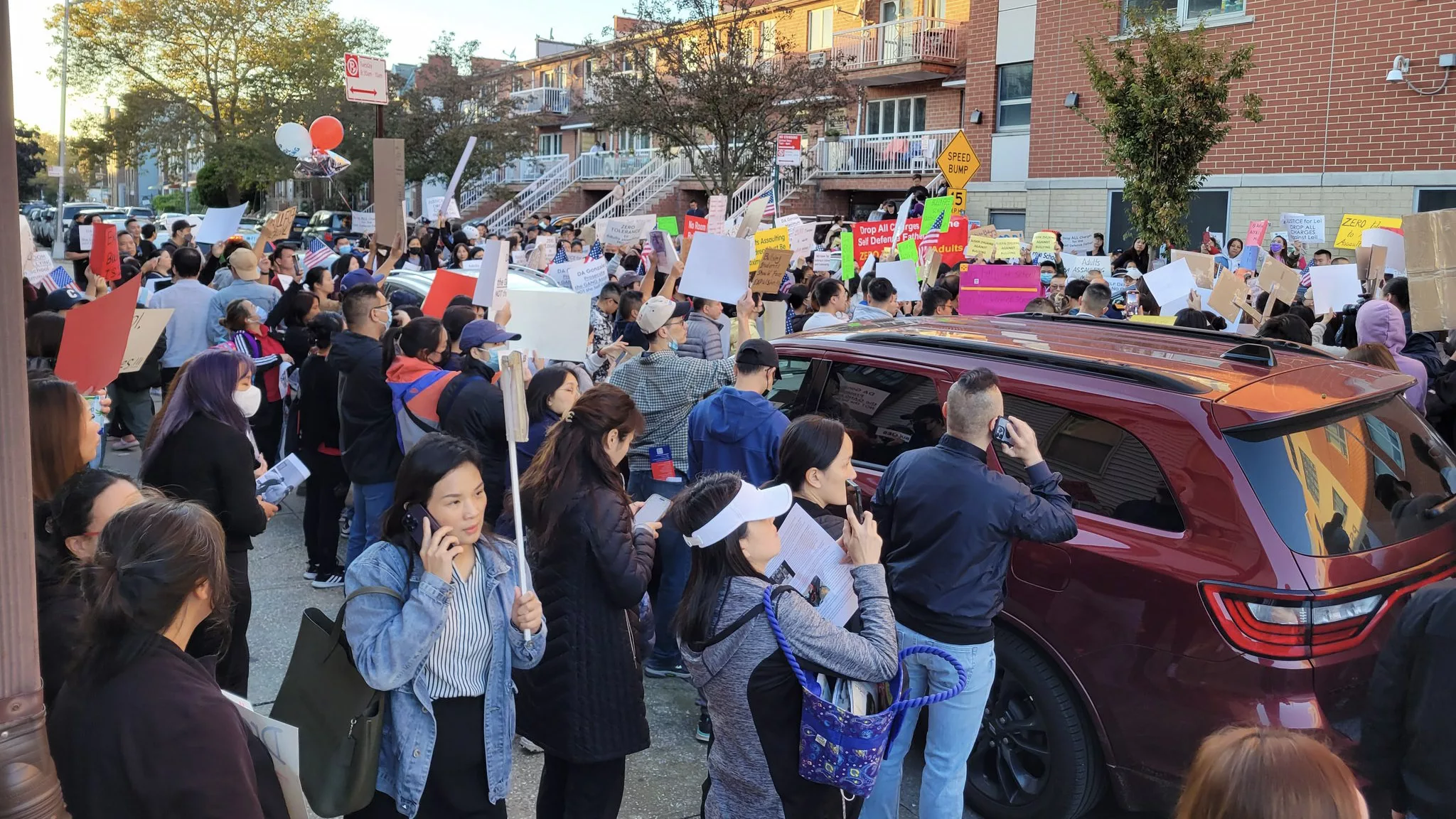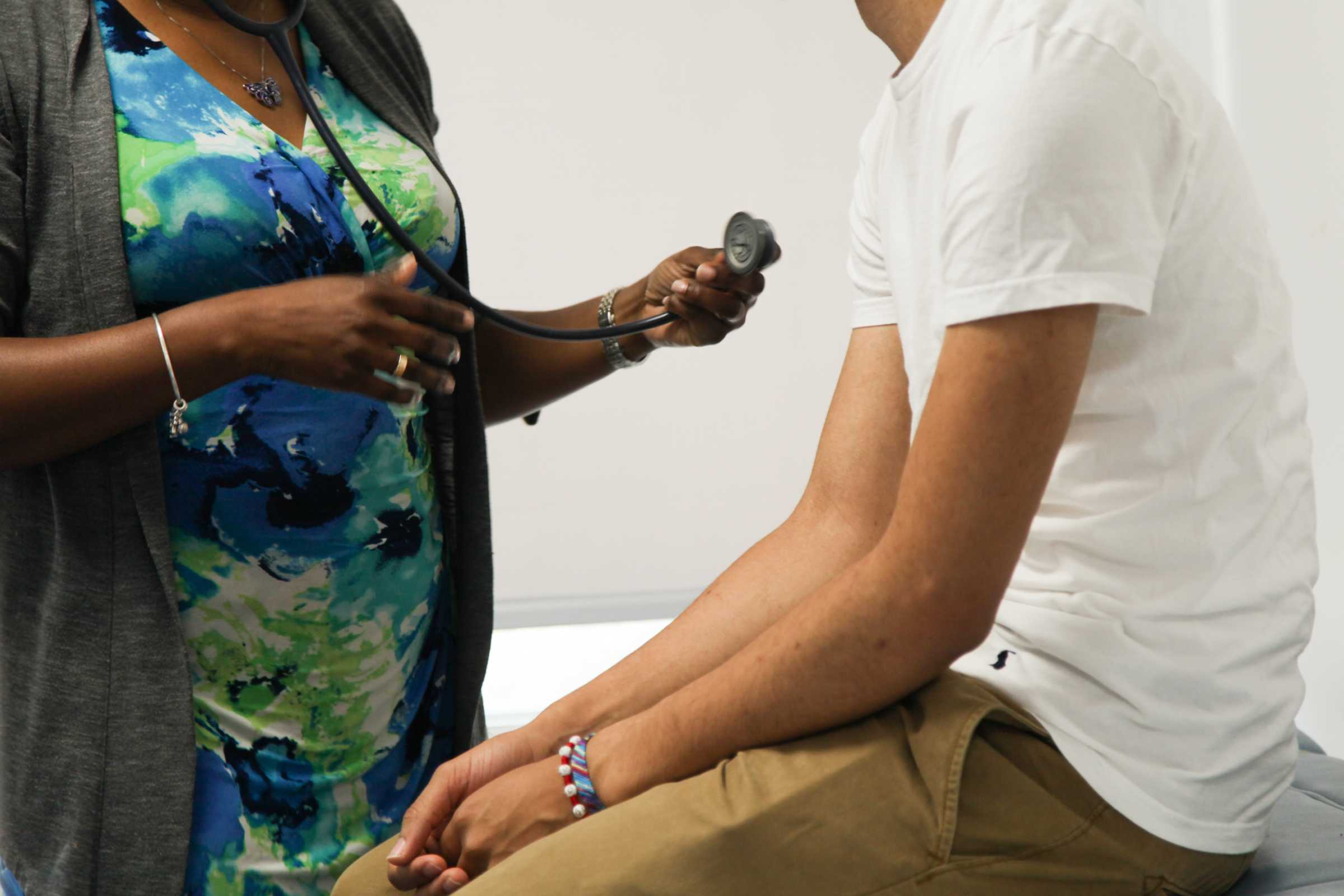阅读中文版:“被霸凌是我们共同的人生经历”: 为何201中学事件点燃布鲁克林华人怒火
At IS 201’s schoolyard in Dyker Heights one afternoon in September, a 13-year-old Chinese American boy and his friend were playing basketball, when two brothers from the same school tried to join them. The boys refused to let them join, prompting the brothers to call over their 24-year-old relative, Hassan Saab, who quickly arrived at the court. He confronted the boys, according to video recorded that day, punching and kicking the 13-year-old until he fell to the ground.
Two days later, on Sept. 30, the incident escalated even further.
Armed with a baseball bat, Saab and his family members showed up at the boy’s residence, and began yelling anti-Asian slurs. A brawl broke out between the boy’s father, Tingduo Lei, and Saab, leading to the arrest of both men by the police.
Lei, 52, said he never anticipated a scuffle over a basketball game involving his 13-year-old son in late September would rapidly devolve into a criminal case. But what surprised him even more was that in the following month, hundreds of members of Brooklyn’s Chinese community rallied to support him and his family, projecting their own trauma faced as immigrants and Chinese Americans onto this incident.
Several community members and elected officials who participated in protests told Documented that the Chinese community’s response to the incident mirrored their shared life experience as many among them, as well as their children, have encountered bullying in schools.
“Getting bullied is our shared life experience”
The widespread sharing of the incident’s video and news about Lei’s arrest on seven charges has ignited a fervent reaction within Brooklyn’s Chinese community.
Outraged Chinese parents and local residents organized several large-scale protests over the past month, with one drawing approximately 500 participants on Oct. 11. Their demands included urging the Brooklyn District Attorney to dismiss the charges against Lei, imposing the maximum sentence for Saab, and pressuring the Department of Education (DOE) and schools to implement more robust measures against school bullying.
On the day following the protest on Oct. 11, IS 201 held a closed-door meeting with representatives of the Chinese parents, informing them that the two brothers had been suspended, according to World Journal.
Following the incident, Saab faces 14 counts of assault, menacing and harassment charges, according to court records. Lei, who had previously been arrested for assault (the charges dropped earlier this month), suffered a skull fracture necessitating six staples, along with a broken finger and various other bruises to his body, according to a statement by Chinese community organizations.
IS 201 declined to comment on this incident.
“Bullying has absolutely no place in our school communities,” Chyann Tull, Deputy Press Secretary of DOE, said in a statement. The DOE emphasized that following the investigation of bullying incidents, schools are required to inform the parent or guardian of the student about the outcome of the investigation. Outside school, the NYPD handles all related incidents, the agency explained.
Yifang Chen, a Brooklyn resident and president of Higher with Our Parent Engagement, a nonprofit supporting parents, shared that the incident stirred up memories of her own experience with bullying at New Utrecht High School after immigrating from China to New York at the age of 16. Chen, now a mother of three, reflected on the parallels between her past and the current situation. “I had to stop a few times while attempting to finish watching the videos; I just couldn’t continue,” Chen recalled when she initially viewed the footage capturing Saab’s attack on Lei’s son.
At an Oct. 30 protest to demand they drop charges against Lei, a Chinese mother of a 12-year-old girl with high-functioning autism told Chen her daughter had been violently attacked that same day. During the protest that day, she said she received a call from her daughter’s school, informing her that her daughter had been assaulted again by another classmate to the point of losing consciousness at school.
“Getting bullied is our shared life experience, and we have witnessed it happening again and again without effective intervention from schools or the Department of Education. It’s time for us to step up and say ‘Enough is enough!” said Chen.
Chen pointed out that many of these bullying incidents, however, seem to lead nowhere, leaving many immigrant parents, who face challenges navigating the school system and communicating with schools, feeling helpless and upset during such situations.
“Their longstanding dissatisfaction with how schools and the DOE handle bullying has now found an outlet for expression through this incident,” said Chen.
Beyond a schoolyard fight
Some community members believe that this incident has gone far beyond the scope of anti-bullying — they view it as a reflection of the insecurity felt by the Chinese community due to perceived unfair treatment and crimes in recent years.
“I feel like parents felt so strongly about rallying and speaking up because we saw ourselves,” Yiatin Chu, the president of the Asian Wave Alliance, referring to Saab arriving at Lei’s home with weapons, told Documented. “It was just a very ordinary type of thing that can happen to anyone. And if we don’t do something, we’re going to be next, or our friend or our neighbor could be next.”
Sam Ni, a Brooklyn advocate and one of the organizers of the protests, said he felt surprised about the scale of the first protest before the Community Education Council 20 meeting on Oct. 11 at PS 264. “We didn’t expect there would be so many people showing up for the protest within just two days after we released the flier of the protest,” he said.
Ni noted that the arrest of Lei has deeply concerned many Chinese community members, who “have already been extremely anxious about safety issues because of the incidents and crimes targeting Asians during the pandemic.” Now, they fear that defending their families may even result in unwarranted legal consequences, eroding their sense of personal safety.
“When they feel it’s unsafe to take the subway during the pandemic, they can choose not to take subways. But when someone comes to your home and tries to beat you up, where else can you go?” said Ni.
Also Read: Self-Defense Laws: What Counts as Self-Defense in New York?
Donghui Zang, a father from Queens and the president of NYC Residents Alliance also attended the protests to show support for Lei. The incident sent a strong signal to the Chinese community, he said, noting that the explosive response from the community was because the fight made them “feel that they have been pushed to the limit.”
On Nov. 2, the Brooklyn District Attorney’s Office dismissed assault charges against Lei and concluded his actions were in self-defense. Many members of the Chinese community perceived this as a victory in their collective efforts.
Lei, accompanied by his spokesperson Karlin Chan, a Chinese community activist, expressed gratitude for the overwhelming support from the community. Chan mentioned that the Lei family is undergoing therapy following the incident.
While many Chinese community members believe that the incident is not primarily driven by racial factors, Chan is actively pushing for Saab to be charged with a hate crime, referring to video recordings of Saab yelling anti-Asian slurs upon arriving at Lei’s home on Sept. 30. Saab pleaded not guilty and was released with non-monetary conditions. His lawyer has not responded to requests for comment as of the publication of this article.
State Senator Iwen Chu, representing Senate District 17, has been assisting the Lei family since the incident. She attributes the rapid amplification of the incident in the Chinese community to the interplay of various factors. Chu believes that the growing awareness of advocacy and civic engagement in the Brooklyn Chinese community, shaped by several high-profile cases in the past decade, has also been vital.
As an immigrant herself, Chu has noticed the changes in the Chinese community. She noted that a decade or more ago, there was a prevalent notion of “Chinese ducking their head when things happen.”
However, in the wake of significant events, such as the massive support for Chinese policeman Peter Liang in 2016, the gathering of hundreds demanding the trial of the man who killed three Asian men with a hammer in 2019, and various other civic engagement activities, “the Chinese community gradually learned their power in advocating for what they believe is right. They learned how to empower their community and speak up for themselves,” noted Chu.
“Let’s make some noise, let’s build on the momentum to let people know that you’re attacking Asians. We are tired of listening to politicians,” said Chan. “We’re tired of the lip service. We want action.”















